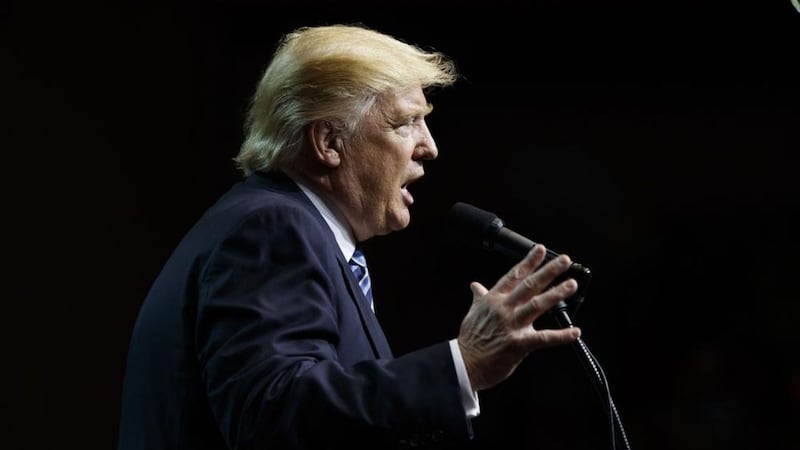THE news that former President George HW Bush has decided to vote for Hillary Clinton rather than Donald Trump tells you three things.
He is so concerned about President Trump inflicting huge electoral damage on the Republican Party further down the line that he is prepared to do anything he can to wreck his chances of victory (and let's not forget that Bush was beaten by Bill Clinton in 1992); the Democrats are now so concerned about Hillary's diminishing lead that they are prepared to court "decent" Republicans, and key figures and strategists in both parties now believe that Trump could win.
Bush isn't the only Republican swapping sides. His daughter-in-law Laura, wife of George W Bush, has dropped a massive hint that she wants Clinton in the White House.
Her brother-in-law, Jeb, has said he will abstain or vote for the Libertarian candidate. Former presidential nominee Mitt Romney was particularly brutal: "I wanted my grandkids to see that I simply couldn't ignore what Mr Trump is saying and doing, which revealed a character and temperament unfit for the leader of the free world.
I know that some people are offended that someone who lost and is the former nominee continues to speak, but that's how I can sleep at night."
And many senior advisers in Republican administrations from the 1960s onwards have also warned that Trump is 'unfit' for office.
But what the aristocracy of the Republican Party, the increasingly wordy editorials from the mainstream media and the snooty mouthpieces of the Democrat Party seem to have failed to notice is that their contempt has become catnip for Trump.
The more they bombard him with criticism and laud Clinton as a "properly professional and well-tested leader-in-waiting," the more support he gathers.
He doesn't want to be like Clinton, or Bush, or Obama, or even Reagan. He doesn't want to be judged by their yardsticks of success.
He doesn't want to tick the boxes that the media and world leaders say he should tick. In other words, he doesn't give a damn about any of them; or of anything that has gone before.
Trump is a product of "look at me, look at me" reality TV. Most of those products have been pop singers, models, mediocre wannabes, left-footed dancers and former celebrities who'll sell their soul and dignity for a fistful of dollars.
But Trump is the first political product. The first candidate to treat the entire campaign as the equivalent of a phone-in talent show.
He knows that the public is so disengaged from 'normal' politics that they'll buy into the concept that the bizarre, lunatic and downright nuts is the new 'normal.'
He doesn't pander or patronise. He doesn't do nuance or shading. He doesn't bother with facts or costed, thought-through policy platforms.
In a world in which YouTube videos of dancing hamsters attract millions of viewers and TV ratings are topped with programmes like Big Brother and Celebrity Autopsy, he knows that shooting-from-the-hip stupidity beats a Hillary speech any day of the week.
Trump is a practitioner of what has become known as post-truth politics: creating your own realities and truths and preferring the outrageous to the provable.
A recent piece in The Economist noted: "There is a strong case that, in America and elsewhere, there is a shift towards a politics in which feelings trump facts more freely and with less resistance than used to be the case.
Helped by new technology, a deluge of 'facts' and a public much less given to trust than once it was, some politicians are getting away with a new depth and pervasiveness of falsehood. If this continues, the power of truth as a tool for solving society's problems could be lastingly reduced." And that's the perfect background for someone like Trump.
Will he win? Hmm. When I suggested, back in February, that his chances of winning the nomination were "actually quite high," most readers thought I had had one glass of Pimms too many.
But if he wins - which I think is unlikely, because the electoral tide is still running towards same-old, same-old - then anything is possible.
And possible because there has never been a president like Trump. Yet if he loses I suspect that someone even more belligerent will emerge.
There are millions of Americans who will believe that the system has been rigged to help Clinton: and those millions, fuelled by social media conspiracy theories, bile, untruth, half-truth and pure fantasy, will look for another champion.
Trump has changed American politics. This isn't a passing phase. The old political system and structures are crumbling around the ears of the political/governing elite.
So far they haven't produced a credible, coherent response, because they haven't recognised, let alone acknowledged, the sheer scale of this particular Tea Party.
Things are about to become much nastier in American politics and a coming together of the Bush and Clinton dynasties (and their huge courts of flunkies) isn't going to stop it.








